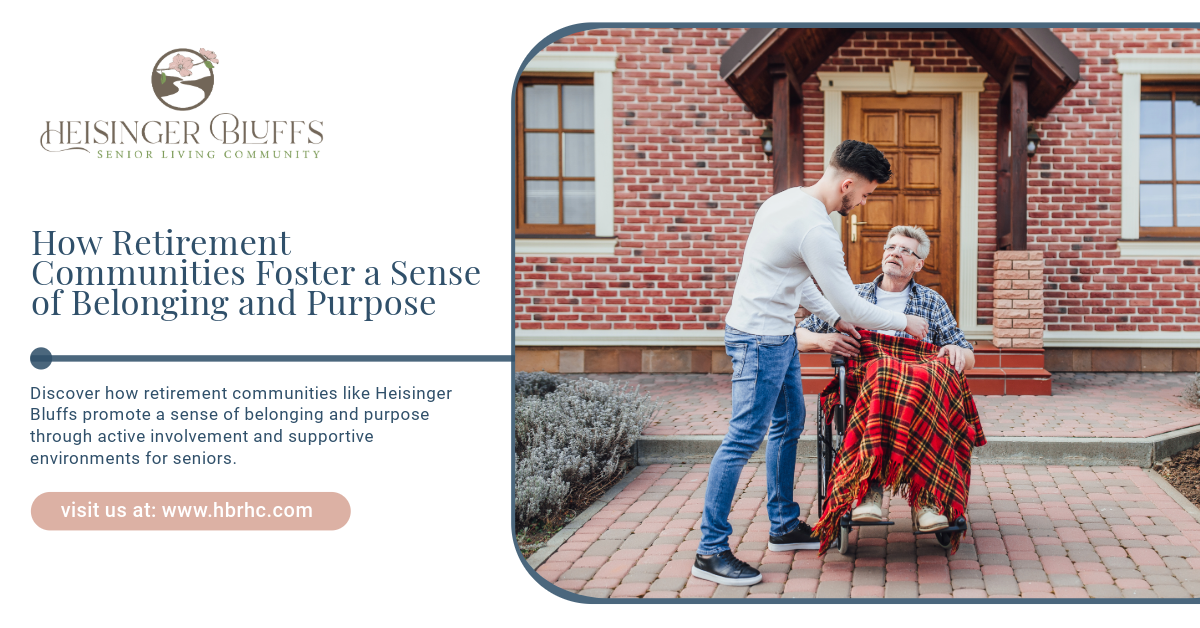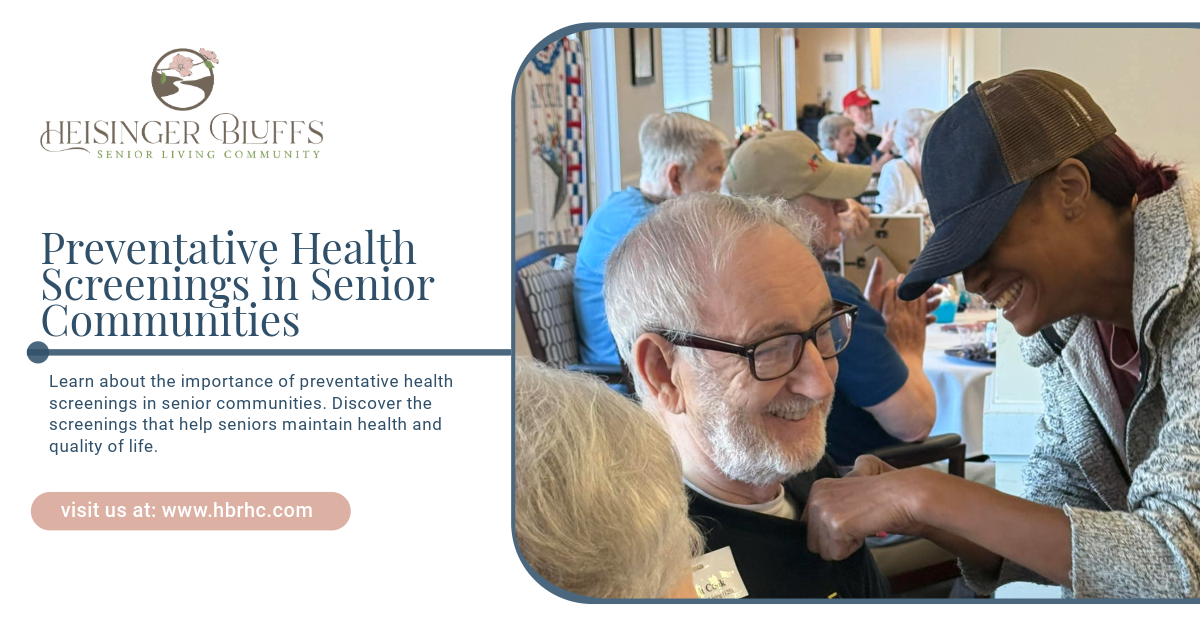How Retirement Communities Foster a Sense of Belonging and Purpose

Retirement is often viewed as a time for relaxation and personal enjoyment. However, for many seniors, retirement can also bring feelings of isolation, especially if they are living alone or lack social interaction. Fortunately, retirement communities are designed to offer more than just a place to live—they are environments that promote a strong sense of belonging and purpose. This article will explore how senior living communities, such as Heisinger Bluffs in Jefferson City, foster meaningful connections and help residents lead purposeful lives.
The Importance of Community in Retirement
A sense of community is essential for people of all ages, but it becomes even more crucial as we age. Studies have shown that older adults who feel socially connected experience better mental and physical health. Conversely, social isolation can contribute to depression, anxiety, and even physical decline.
For seniors, living alone can be particularly challenging as they may no longer have daily interactions with coworkers, friends, or neighbors. As mobility decreases and health issues arise, it may also become harder for seniors to engage in social activities. This is where retirement communities come in, offering seniors a chance to form new friendships and engage in regular social activities that help keep feelings of loneliness at bay.
Building Connections through Social Activities
Retirement communities provide a wide variety of social activities designed to help residents build connections. These activities may include group exercises, art classes, gardening, book clubs, and cultural outings. These events provide opportunities for residents to meet others who share their interests, which helps to create lasting friendships.
In addition, many retirement communities host regular social events such as themed dinners, movie nights, and holiday parties. These events give residents something to look forward to and provide an environment where they can relax, have fun, and feel connected to their peers.
Participation in these activities not only combats loneliness but also contributes to cognitive and emotional well-being. For example, research shows that engaging in creative activities can improve cognitive function and promote mental health in older adults. Group exercise programs also offer the benefit of maintaining physical health, which is key to feeling purposeful and engaged.
Fostering a Sense of Purpose through Volunteering and Leadership Opportunities
Retirement communities offer a variety of ways for residents to contribute their talents and skills. Many residents find purpose through volunteering both within the community and in the surrounding area. For example, some seniors choose to mentor younger individuals, lead peer groups, or assist with community events.
Others may serve in leadership positions on resident advisory boards or committees, where they can have a say in planning activities or improving community life. Leadership roles not only empower residents but also give them a sense of purpose by allowing them to contribute to decisions that impact their living environment.
By offering these opportunities, retirement communities help seniors feel like valued members of the community. Volunteering, in particular, is linked to greater life satisfaction and improved mental health. When seniors feel that their contributions are making a difference, they experience a stronger sense of self-worth and fulfillment.
Physical and Emotional Well-being through Wellness Programs
Retirement communities are increasingly focusing on holistic wellness, offering programs that address the physical, mental, and emotional health of residents. Wellness programs often include fitness classes, meditation, nutrition workshops, and mental health support services.
These wellness programs not only promote physical health but also foster emotional well-being. Group fitness classes or walking clubs allow residents to work out in a supportive environment while building friendships with others who share their health goals. Meditation and mindfulness sessions can help seniors manage stress, feel more connected to their surroundings, and improve overall mental clarity.
Additionally, many retirement communities offer access to mental health professionals who provide support and guidance. These services ensure that residents receive the care they need to maintain emotional balance and stay engaged in their daily activities.
The Role of Meaningful Engagement in Preventing Cognitive Decline
Meaningful engagement is crucial to preventing cognitive decline in older adults. Research suggests that seniors who remain mentally and socially active are less likely to experience conditions like dementia and Alzheimer’s disease. Retirement communities play an essential role in creating environments that keep seniors mentally stimulated.
Communities often offer educational programs, workshops, and lifelong learning opportunities. These may include guest lectures on topics of interest, technology classes, or discussions on current events. Staying mentally active by learning new skills or engaging in intellectual conversations can help seniors retain cognitive function and continue leading purposeful lives.
Social engagement also plays a key role in cognitive health. Residents who maintain regular interactions with their peers tend to experience a slower cognitive decline compared to those who are more socially isolated. The combination of mental stimulation and social engagement offered by retirement communities creates a strong foundation for seniors to maintain cognitive health well into their golden years.
Creating a Strong Sense of Belonging through Shared Spaces
Physical design and shared spaces in retirement communities are key to fostering a sense of belonging. Many senior living communities feature communal dining rooms, outdoor spaces, and recreational areas that encourage residents to gather and socialize.
Shared dining experiences, for example, are an excellent way for residents to connect with one another on a daily basis. Mealtimes provide natural opportunities for conversation, which can help residents feel more connected to their peers and less isolated. In addition to daily meals, some communities offer communal kitchens where residents can cook together, further encouraging social interaction.
Outdoor spaces like gardens, walking paths, and patios also provide opportunities for casual encounters and leisurely conversation. These spaces are often designed to be accessible, allowing residents of all mobility levels to enjoy fresh air and sunshine while socializing with friends or engaging in outdoor activities.
By providing accessible, inviting shared spaces, retirement communities create an environment where residents naturally come together, fostering a sense of belonging and camaraderie.
Emotional Support through Peer Relationships
One of the most significant benefits of living in a retirement community is the emotional support that comes from peer relationships. Many residents find comfort in sharing their experiences with others who understand the unique challenges of aging. These relationships help to build a network of support, reducing feelings of loneliness or isolation.
Residents often develop deep bonds with their peers, offering advice, companionship, and encouragement. Having a strong support system within the community can make the transition to retirement living much smoother and more enjoyable.
In addition to peer relationships, staff members in retirement communities play a crucial role in providing emotional support. Trained caregivers and staff often build close relationships with residents, ensuring that they feel cared for and respected. This professional support can greatly enhance residents' overall sense of security and well-being.
Enhancing Quality of Life through Structured Routines and Predictability
For many seniors, having a structured routine can enhance their quality of life. Retirement communities offer a predictable schedule of activities, meals, and social events, which helps residents feel more secure and comfortable in their daily lives.
Routine provides a sense of stability, especially for seniors who may be dealing with age-related changes or health issues. Knowing what to expect each day reduces stress and helps residents feel more in control of their environment.
At the same time, retirement communities offer a balance of structured activities and personal freedom. Residents can choose which activities to participate in based on their interests and comfort levels. This balance allows seniors to maintain a sense of autonomy while enjoying the benefits of community living.
Conclusion
Living in a retirement community offers countless benefits, particularly in fostering a sense of belonging and purpose. From social activities to leadership opportunities, wellness programs to peer support, these communities are designed to help seniors stay engaged, connected, and fulfilled in their golden years. For families considering a supportive living environment for their loved ones, a retirement community like Heisinger Bluffs offers a place where seniors can thrive.











